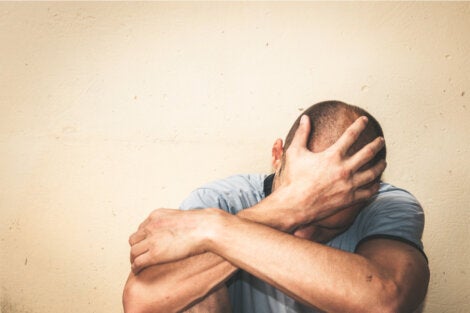Why Anxiety Makes You Tired


Written and verified by the psychologist Valeria Sabater
Why am I so tired when I’m anxious? Many people ask themselves this question when they’re going through psychologically difficult times. Your body feels heavy, your muscles hurt, you feel a tightness in your chest, and you constantly need to sit down to rest. What’s going on here? In today’s article, we’ll address why anxiety makes you tired.
A lot of research addresses this question, with studies going back as far as World War I. Hospital staff noticed that many of the soldiers going back to the frontlines were suffering from anxiety and depression on top of their physical injuries. In addition to these cognitive issues, another common symptom emerged: extreme and persistent exhaustion.
Doctors at the time called this phenomenon “combat fatigue”. Over the years, scientists have gained a better understanding of the underlying biochemical and physiological processes at work with these psychological conditions. Let’s take a closer look.

When anxiety makes you tired: factors to consider
Tiredness tends to have one of two causes: it’s either the result of sustained physical effort or psychological factors. The latter might seem contradictory, but the data backs it up.
A study conducted at the University of Manitoba in Canada revealed an important aspect of the link between anxiety and exhaustion. The impact of depression and anxiety disorders on the workplace is immense. One of the factors most closely associated with poor work performance is fatigue. A significant number of people are too tired at work to concentrate or be productive to achieve their goals.
The study also showed that the fatigue caused by anxiety and depression can also make it difficult to lead a normal life. The things you used to enjoy, such as going out with your friends or practicing some kind of hobby, suddenly seem like too much. They require a level of effort and energy that you simply don’t have. But why? Why does anxiety make you feel so tired? Here are some of the common causes.
Adrenaline and anxiety: relentless physical activation
Stress and anxiety both stem from an increase in your body’s production of adrenaline and noradrenaline. The purpose of these two hormones is to help you react to or escape from threats and danger.
- The release of adrenaline and noradrenaline increases your heart rate, your breathing, and your blood pressure. It also facilitates the release of cortisol. In normal circumstances, this is a brief reaction. Once the threat is gone, your body returns to normal.
- If you suffer from anxiety, however, and the “threat” that you perceive isn’t something concrete (such as a wild animal), the production of these hormones is on overdrive. Their continued presence in your body can be very harmful. It can cause fatigue, headaches, digestive problems, tachycardia, etc.
Exhaustion isn’t usually the only symptom for people suffering from anxiety disorders. They generally experience many of the symptoms we mentioned above as well. All of that’s the clear manifestation of a constant state of alertness and activation, which can, as you might imagine, be exhausting.
The effect on your muscles
If you have chronic anxiety or you’ve experienced it at certain times in your life, you know how it feels. Anxiety makes your body feel heavy and awkward. Your legs hurt, your arms feel weak, and your back and neck are tense.
Anxiety has its most marked effect on your muscles. That’s because the brain sends all your energy to your muscles so that they’ll react to the fight or flight message. The accumulated tension from this constant state of alert can cause pain and exhaustion.
Your brain might be sending you a message
If you’ve ever wondered why anxiety is making you tired, you should think about whether your body is trying to tell you something. Your exhaustion might be a kind of defense mechanism from your brain. The fatigue and lethargy that you feel could be your brain’s way of making you stop.
One very important aspect of this kind of exhaustion is that you can’t get rid of it by sleeping for thirty hours. In other words, physical rest won’t resolve a mental problem.
The purpose of this response from the brain is to get you to stop and regroup. Changing habits, establishing priorities, managing emotions, and healing past and present conflicts are the best ways to manage.

Don’t neglect your health
We know that anxiety has a whole slew of psychological and physical manifestations. Among them are constant worrying, concentration problems, trouble sleeping, stomachaches, and physical exhaustion. It’s important, however, not to assume that your symptoms are caused by anxiety. Visit your doctor to rule out underlying health problems.
Thyroid problems and anemia could also be causing your chronic fatigue. Getting a diagnosis from a healthcare professional is crucial to put you on the path to healing.
When your body is trying to tell you something, make sure to listen and give it what it needs.
All cited sources were thoroughly reviewed by our team to ensure their quality, reliability, currency, and validity. The bibliography of this article was considered reliable and of academic or scientific accuracy.
- Enns W. William, Bernstein. Charles (2018) The association of fatigue, pain, depression and anxiety with work and activity impairment in immune mediated inflammatory diseases. Plos One. doi: 10.1371/journal.pone.0198975
This text is provided for informational purposes only and does not replace consultation with a professional. If in doubt, consult your specialist.








